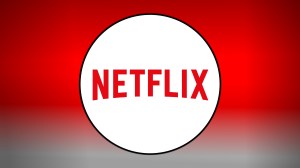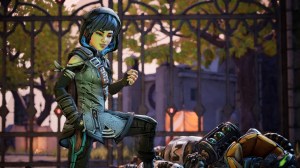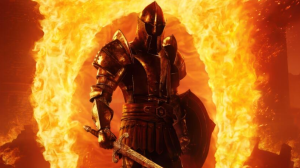Star Wars: The Last Jedi is a very timely film, which keeps with the franchise’s tradition of offering fans socio-political messages wrapped up in an intergalactic adventure tale. Given the turbulent times surrounding The Last Jedi’s arrival in theaters, it’s no surprise that fans are latching on hard to the political subtext of the film – especially the rally cry for the future that is in many ways The Last Jedi‘s biggest message.
Videos by ComicBook.com
A Time Of Failures
The thematic center of Star Wars: The Last Jedi is no doubt the training that Rey receives from Luke Skywalker, and the ideas on how/why the Jedi should continue, raised by that storyline. The themes of the film really come into focus in the cameo scene between Luke and Yoda’s Force ghost, where the latter helps Luke destroy the Uneti tree on Ahch-To, one of the most ancient sites of he Jedi Order.

In that scene, Luke is lamenting his failures over the years to Master Yoda, who in turn chastises Luke for never learning the lessons imparted upon him during Empire Strikes Back and Return of the Jedi: namely, that failure is the best teacher, a natural part of how both teacher and student grow into something better. This was a thematic concept that resonated throughout The Last Jedi, as all of our main heroes (Finn, Rey, Poe) “fail” in their goals, only to gain wisdom and insight that will grow them into the true leaders of The Resistance.
In a real-world sense, this thematic idea attempts to sooth the pervasive sentiments of despair, disappointment, disillusion and anger that are now woven into the fabric of our daily political discourse. The Last Jedi reminds us that the dark times when we feel like we’re at our lowest point, full of regret, with everything seemingly screwed up, we’re actually being handed the opportunity to grow and evolve into something better, if we just keep our perspective clear, and our resolve strong. It’s a an important setup for the finale of the film, in which this socio-political thematic point gets hammered home with single line:
“We Have Everything We Need”

There’s been a lot of discourse about how Star Wars: The Last Jedi is the most progressive film in the series when it comes to things like diversity, gender equality, and other topics important to our current discourse on social progression. In fact, that socio-political progression in the Sequel Trilogy films has earned real-world backlash from fringe political / hate groups! Indeed, The Last Jedi takes a colorful blend of men and women and sets them against seemingly insurmountable odds, with much sacrifice required to defeat an authoritarian power oppressing them. The point of that fight is not immediate victory (Poe’s repeated mistake), but rather the long-term goal of keeping a spark of hope lit, that will grow into a raging fire of resistance, carried by a new generation of leaders.
It’s not hard to see how that story would resonate with those who joined the very real-world resistance movement that swept over America (and beyond) in 2017. From anti-Trump rallies, to gender and racial equality rallies, this was a year where we saw burning embers of resistance come together into a surging flame, with 2018 already being labeled by pundits, analysts, and grassroots organizers, as a battleground year for fighting against authoritarian powers rearing their heads right now. No matter how your politics stack up against that idea, it’s clear that The Last Jedi is a film that (directly and indirectly) echoes the sentiment.
The final scene of the film sees the late Carrie Fisher’s Leia comfort young Rey, who is looking at her broken lightsaber as a symbol of the impossible odds facing The Resistance. When Rey questions what the rebels can possibly hope to do now, with so little resources and so much opposition, Leia simply tells her with maternal confidence that it will be okay, “We have everything we need.” It’s not just a statement of hope teasing The Resistance striking back in Star Wars: Episode IX – on a larger thematic level, it is both a comfort, and a rally cry.
2018: Year of Resistance

With the political battleground of 2018 a minefield, analysts are ready for one of the biggest challenges to the establishment since the 1960s. Star Wars: The Last Jedi never denies the fact that things have gotten darker (both in the continuity of the saga, and in the real world), but instead examines the nature of how mistakes of both the past and present contributed to that darkness – and why now more than ever, it is imperative keep the spark of hope alive.
It must be remembered that George Lucas’ original Star Wars came from a progressive ’60s kid making films in the ’70s – a story that conveyed the spirit of rebelling against authoritarian or fascist powers to millions of viewers. With the threats of authoritative fascism, intolerance, and bigotry so clearly visible right now in societies all over the world, it would be a fitting full-circle turn for Star Wars: Episode IX to bring the Skywalker saga to a close by embracing the progressive surge taking place, and making a final statement about how a diverse coalition uses hope and love to push back the darkness. Hopefully, we’ll have done the same in the real-world, by then.
****
Did you pick up on the political subtext of The Last Jedi? Or does it seem like a stretch? Let us know @ComicbookNOW!
Star Wars: The Last Jedi is now in theaters. Solo: A Star Wars Story arrives on May 25, 2018; Star Wars: Episode IX follows on December 20, 2019.









